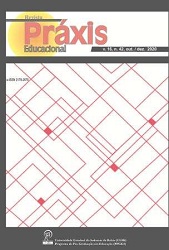THE ARITHMETIC IN THE SECTION FOR SMALL MATHEMATICIANS OF THE ECHO MAGAZINE
DOI:
https://doi.org/10.22481/praxisedu.v16i42.6281Keywords:
History of Education, Jesuits, MathematicsAbstract
The theme of this article is the Mathematics in a magazine published by a Jesuit college in Rio Grande do Sul, in the 20th century. The objective is to analyze the arithmetic knowledge in recreational problems in the section For Small Mathematicians of The Echo magazine. As the theme is inserted in the History of Mathematics Education in the gaucho state, this qualitative and documentary study is based on cultural history for analysis of the magazine, published by Anchieta College of Porto Alegre, in the last century. The target audience of the Echo was the school community and the Brazilian Catholic youth, as there were no magazines for the young students, with religious and moral content and general formation. In the recreational problems analyzed, arithmetic knowledge related to fundamental operations, divisibility criteria, progressions, permutations and simple arrangements was observed, evidencing the logical reasoning and charades. The editors sought to arouse the interest and curiosity of studious youth, contributing to circulation of the magazine and formation of the Catholic youth in the schools where it circulated.
Downloads
Metrics
References
BRITTO, Silvio Luiz Martins. O ensino da aritmética nas escolas paroquiais católicas e no Ginásio Conceição, sob a ótica dos jesuítas nos séculos XIX e XX. 2016. 464 f. Tese (Doutorado em Ensino de Ciências e Matemática) – Universidade Luterana do Brasil, Canoas, 2016.
BRITTO, Silvio Luiz Martins; BAYER, Arno; KUHN, Malcus Cassiano Kuhn. A contribuição dos jesuítas para o ensino da Matemática no Rio Grande do Sul. São Leopoldo, RS: Ed. UNISINOS, 2020.
CHARTIER, Roger. A História Cultural: entre práticas e representações. Lisboa: Difel, 1990.
KUHN, Malcus Cassiano. O ensino da matemática nas escolas evangélicas luteranas do Rio Grande do Sul durante a primeira metade do século XX. 2015. 466 f. Tese (Doutorado em Ensino de Ciências e Matemática) – Universidade Luterana do Brasil, Canoas, 2015.
KUHN, Malcus Cassiano; BAYER, Arno. A matemática nas escolas paroquiais luteranas gaúchas do século XX. Canoas: Ed. ULBRA, 2017.
LEITE, Luiz Osvaldo. A revista O ECHO e sua trajetória. Porto Alegre/RS, 16 mar. 2018. Estágio Pós-doutoral em Programa de Pós-Graduação. Entrevista concedida a XXX.
O ECHO: revista ilustrada para a mocidade estudiosa. Typographia do Centro: Porto Alegre, 1914-1931.
O ECO: revista ilustrada para a mocidade brasileira. Tipografia do Centro: Porto Alegre, 1932-1969.
RELATÓRIO DO COLÉGIO ANCHIETA. Porto Alegre, 1914. p. 28.
SERRA, Áurea Esteves. As associações de alunos das escolas normais do Brasil e de Portugal: apropriação e representação (1906-1927). 2010. 290 f. Tese (Doutorado em Educação) – Universidade Estadual Paulista, Marília, 2010.
SPOHR, Inácio. Memórias dos 665 Jesuítas da Província do Brasil Meridional. Novembro de 1867 – novembro de 2011. Porto Alegre: Livraria e Editora Padre Reus, 2011.
VALENTE, Wagner Rodrigues. História da Educação Matemática: interrogações metodológicas. REVEMAT – Revista Eletrônica de Educação Matemática, UFSC, v. 2.2, p. 28-49, 2007.
WEIDUSCHADT, Patrícia. A revista “O Pequeno Luterano” e a formação educativa religiosa luterana no contexto pomerano em Pelotas – RS (1931-1966). 2012. 273 f. Tese
(Doutorado em Educação) – Universidade do Vale do Rio dos Sinos, São Leopoldo, 2012.
Downloads
Published
How to Cite
Issue
Section
License
Copyright (c) 2020 Práxis Educacional

This work is licensed under a Creative Commons Attribution-ShareAlike 4.0 International License.
You are free to:
Share - copy and redistribute the material in any medium or format; Adapt - remix, transform, and build from the material for any purpose, even commercially. This license is acceptable for Free Cultural Works. The licensor cannot revoke these freedoms as long as you follow the terms of the license.
Under the following terms:
Attribution - You must appropriately give credit, provide a link to the license, and indicate if any changes have been made. You may do so in any reasonable way, but not in a way that suggests that you or your use is endorsed by the licensor.
There are no additional restrictions - You cannot apply legal terms or technological measures that legally restrict others to make any use permitted by the license.










